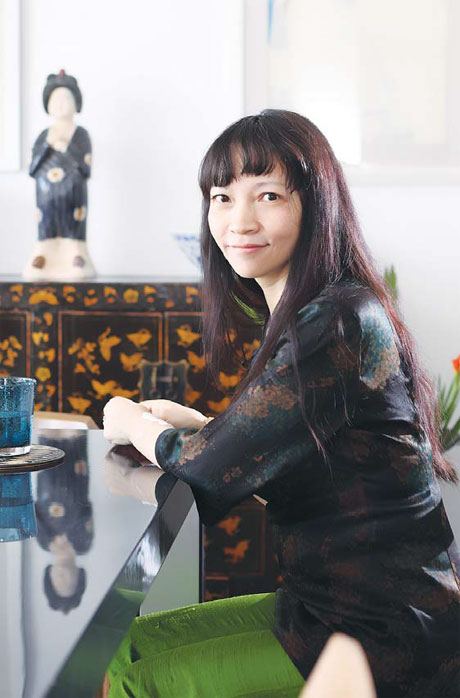The worthy daughter
Hong Ying spotlights the mother-daughter relationship in her latest novel, Mimidola: The River Child
Author Hong Ying says she writes only three types of novels - those that seek to understand and explore a house, a city or the world.
Yet a lingering theme of many of her signature works is the mother-daughter relationship.
|
Chinese author Hong Ying has shifted focus to children's books, and her latest novel is a fantasy about a 10-year-old girl's adventures. Photos Provided to China Daily |
In her latest novel, Mimidola: The River Child, by People's Literature Publishing House, a beautifully illustrated fantasy story for young readers, the mother is absent from the beginning, leaving a 10-year-old Mimidola to undertake adventures by herself. After an intense journey to the underground and to ancient India in four magical days, she grows up, brave and witty enough to conquer fear, eliminate a flood and reunite with her mother.
"I had a terrible childhood being a daughter born out of wedlock," Hong Ying, 54, tells China Daily at her Beijing apartment. "Mimidola is my effort to reconcile with those memories."
The Chongqing-born author's real name is Chen Hongying.
She took five years to finish this book, whereas her earlier novels like K: The Art of Love, were done in months, she says.
The author also discovered her latent sense of humor through her latest novel, as she makes many jokes between the lines, a rarity in her previous works.
Unlike Mimidola from Jiangzhou, a fictional version of Chongqing in Southwest China, the writer's memories of the 1960s and early '70s with her mother are painful.
Hong Ying says her mother seldom spoke to her.
"In between those miseries, I spread my wings of fantasy, imagining that I was loved and that I could fly across the Yangtze River, and I felt my pains soothed," she recalls.
"Later, I realized she was just trying to protect me so she kept a distance from me - the extra child in the family," she says. "But her apathy made me rebellious. I did everything she told me not to, and I paid the price for it."
Hong Ying left home at a very young age to study writing at Lu Xun Academy in Beijing and Fudan University in Shanghai. She left the country for a stay in Britain in the 1990s and returned to Beijing in 2000.
She records those years in her autobiographic works, Daughter of the River in 1997 and Good Children of the Flower in 2009, both of which are available in multiple languages.
Fellow author A Lai says when the two novels were reprinted in April, he was astounded to read such a courageous and frank account of cruelty in the times of hunger and disasters that a generation of Chinese faced, while most other writers learned a "skillful way" to hide it.
It is her own daughter, Sybil, born in 2007, who gradually dispersed her childhood resentment and brought a new light into her life and writing, Hong Ying says.
"Sybil is like her father: warm, loving and brave, full of sunshine," she says. The daughter knows her past and the grandma's past through many bedtime stories.
"I don't want her to be possessed by fear, as I was. I'd like her to have the wisdom to control fear."
Her husband, Adam Williams, thinks Hong Ying's books can be read by all age groups.
Mimidola was created by combining her daughter's positive, happy nature and Hong Ying's own wisdom and insights.
"And several Mimidola dialogues are from what Sybil said," she says.
"The heroine of Hong Ying's books is always the daughter," A Lai says. "The author has become a mother herself, so combining the two images, readers get a key to unlock all her emotional secrets."
Hong Ying began to read children's books in 2006 before Sybil's birth. In 2012, Hong Ying began to create stories for her daughter, who by then was bored with the books she had. Two years later, she published her first children's book, The Girl from the French Fort, which has bilingual text with pictures by British illustrator Cherry Denman.
She continued to work with world-acclaimed illustrators for Mimidola, paying special attention to the paper used and the colors for illustrations, according to Zhao Ping from the People's Literature Publishing House.
"We observed a global trend that many acclaimed writers are picking up children's books, too," says Qiu Huadong, literary critic and director of Lu Xun Academy, noting that Mimidola is interesting because it uses cultural details and resources from East and South Asian countries.
In addition, it touches on budding love and also serious social and environmental issues.
"Mimidola is adored by the many characters she meets, but there's no prince charming to save her from trouble. She has to be strong and fight for herself," Hong Ying says.
Though inspired by environmental problems, like the Beijing smog and social issues like missing children, the author says her book is really about parental education.
In the novel, Mimidola is separated from her single parent, the mother, at the beginning of the story. When she is alone, her two companions are her ability to love, passed down from her mother, and knowledge that came from reading books.
"All of us, children or grown-ups have to face disasters, setbacks or miseries that happen suddenly. Maybe 90 percent of us are beaten, but Mimidola isn't. Her mother's education leads her to stand up and fight," Hong Ying says.
Besides novels, Hong Ying also writes poems and is currently working on a film adaptation of her novel The Lord of Shanghai.
meijia@chinadaily



















